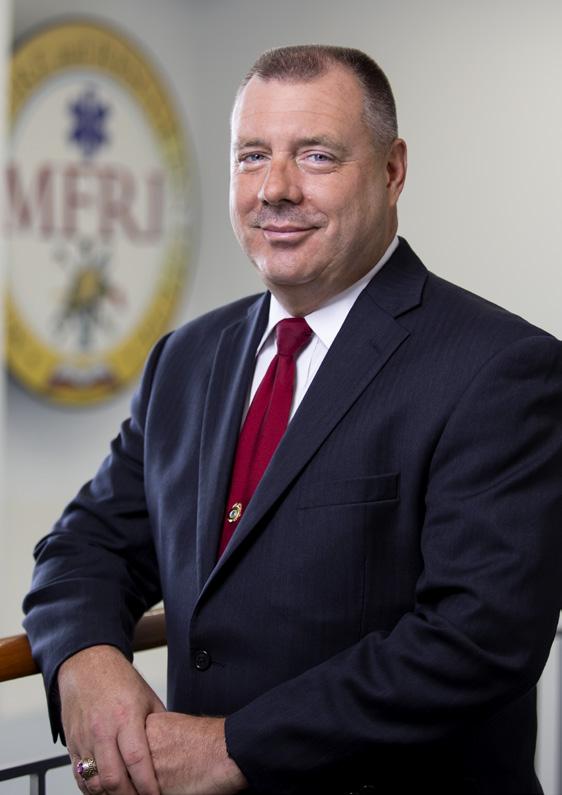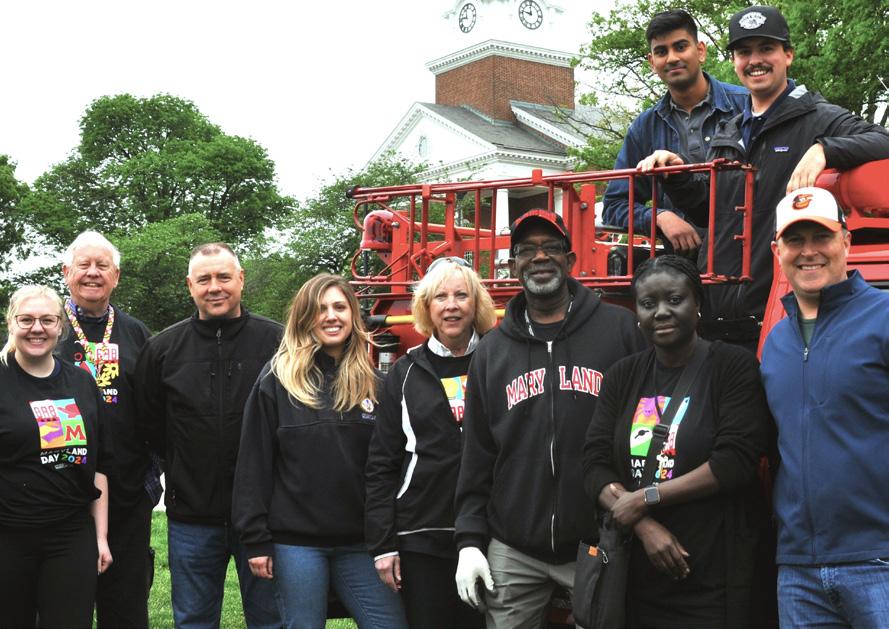UNIVERSITY OF MARYLAND
MARYLAND FIRE AND RESCUE INSTITUTE






During the first weekend in May, the 43rd National Fallen Firefighters Memorial Weekend was held in Emmitsburg, MD to honor 226 fallen firefighters from across the country. Thousands of family and fire service members attended the weekend, which included a candlelight service, an honor flag presentation, a memorial service, a fire hero family flag raising, an honor guard processional, pipes and drums, and a tolling of the bells.
The National Fallen Firefighters Foundation (NFFF) provides travel, lodging, and meals for immediate family members of fallen firefighters being honored. This allows families to participate in a variety of activities and sessions with trained grief counselors and in private and public tributes.
MFRI, in partnership with the Maryland State Fire Marshal’s Office and the Maryland Fire Chiefs

Association, provides transportation and logistical support to ensure the weekend goes as smoothly as possible for the families and friends who attend. With additional assistance from various fire departments in MD and other agencies, more than 200 attendees and their luggage were safely transported by volunteers from airports in Maryland, Washington DC, Virginia, and Pennsylvania.
MFRI volunteers transported an entire truckload of donated bottled water from a Target in Prince George’s County to Emmitsburg. In addition, the crew moved the dining hall and all of its contents to Mt. St. Mary’s University due to inclement weather concerns.
“These are just small examples of a massive, coordinated effort that involves months of planning and hundreds
The Maryland Fire and Rescue Institute of the University of Maryland is the state’s comprehensive training and education system for all-hazard responses. The Institute plans, researches, develops and delivers quality programs to prepare agencies and individuals to protect life, the environment and property.
Bulletin Staff
Editor-in-Chief: Diane May
Managing Editor: Jennifer Ginn
Graphics Manager: Ana Maizel
Assistant Editor: Jenna Robles
Contact MFRI
tel: 301-226-9921 fax: 301-314-0752 www.mfri.org bulletin@mfri.org
The Maryland Fire and Rescue Institute Bulletin (MFRI) University of Maryland (ISSN 1074-2298) is published quarterly by the Maryland Fire and Rescue Institute of the University of Maryland, College Park, MD 20742. Periodical postage paid at College Park, MD 20740. Postmaster: Send address changes to Maryland Fire and Rescue Institute, Bulletin, 4500 Campus Drive, University of Maryland, College Park, Maryland, 20742.
The MFRI Bulletin is distributed as a public service of the University of Maryland. The Bulletin is dedicated to the publication of information that will help educate its readers on the subjects of fire protection, emergency medical services, rescue, leadership and training. This publication may contain some articles and illustrations provided by readers. MFRI does not necessarily agree with information nor endorse any products depicted in the Bulletin. Address all communications to Editor at MFRI. For change of address, send mailing label and new address.
The MFRI Bulletin is produced entirely in house. We extend our sincere gratitude to our contributors who make this publication possible.
Artificial intelligence (AI) and machine learning (ML) are popular buzzwords headlining in newspaper articles, trade publications, and television news. While many think this is new technology, it has been in existence and in use for some time. Simply stated AI can be thought of as the development of intelligent computer systems that can perform tasks normally requiring human intelligence.

AI also includes a subfield known as ML whereby computers learn from data. In other words, machine learning involves the use of algorithms that are trained to find relationships and/or patterns in information to classify and cluster data to make predictions.
Anyone who uses Siri, Alexa, chatbots, image recognition, language translation, decision-making models, credit scoring or e-commerce applications is using AI technology. In fact, AI has also been introduced in the fire and emergency services fields over the past few years. AI programs are being tested and used in code enforcement, fire modeling, predictive analysis, survivability analysis, station locations, mapping, training, incident scene decision-making, and incident scene accountability.
The University of Maryland College Park has created an Artificial Intelligence Interdisciplinary Institute designed to foster the next generation of AI, leveraging the talents of many minds to advance the public good. Stay tuned -- MFRI will surely participate and leverage our combined talents and partnerships with the goal of enhancing training for our state’s first responders.

Michael E. Cox Jr.
Tens of thousands of alums, families, students and members of the community celebrated Maryland Day on the University of Maryland campus at the end of April. MFRI staffers taught attendees how to extinguish fires and demonstrated how home fire sprinklers secure more time for residents to seek safety.
This year, Yama, a tiny red firetruck from Japan, joined in the festivities, entertaining eventgoers and serving as the backdrop for many a selfie. After nearly 30 years of fighting fires in Japan, Yama now resides in Baltimore with its owner, who found the unique vehicle through an online importer. Yama, which means mountain in Japanese, is roughly 6 feet tall and 60 inches wide.
“In Japan, the trucks are popular in urban areas where space is tight and in rural communities that can go offroad,” said Yama’s owner Brett Rogers. “The pump on the back is removable, so two people can walk it right up to a water source. It makes a mess but it works!”
top photo: UMD logistics student and Bladensburg firefighter Greg Otten instructed multitudes of Maryland Day attendees who learned how to extinguish a fire.


bottom photo: Despite the soggy weather, MFRI Maryland Day volunteers introduced festivalgoers to firefighting and prevention. This year, Yama – a small-scale firetruck from Japan – drew many onlookers.
MFRI at National Fallen Firefighter Memorial continued from front page
of fire service personnel from all over the country,” said MFRI State Programs Manager Andy Levy, who coordinates MFRI’s involvement in the weekend.“ More importantly this is an annual showcase of our nation’s fire service brother and sisterhood coming together for a common cause. We truly take care of our own.”
MFRI has been part of the weekend’s logistical support for nearly 30 years and MFRI Operations Section Chief Steve Cox has been part of the team since the beginning. “From providing a reception for the families at the airport, to ground transportation led by an honor guard and motor pool, the goal has always
been to make the journey a little more comfortable for the families,” said Steve. “This is the brotherhood of emergency services. Agencies and individuals coming together to support each other.”
Many family members of the fallen return year after year for the memorial weekend as volunteers.
During the candlelight service, Dr. Lori Moore-Merrell, U.S. Fire Administrator said, “This ceremony exists for one reason -- to show the families and loved ones we honor, as well as their coworkers and everyone who knew them, that our nation recognizes their sacrifice.”
Reversing a years-old mandate, owners of existing Maryland residential high-rises are no longer required to retrofit their buildings to install sprinklers throughout the building or in individual units.

system, the flames are quelled and extinguished in a mere few minutes.
On January 29, 2024, the Office of the Fire Marshal determined that “the Commission’s general determination that existing high-rise buildings be retrofitted with sprinklers will not be enforced.” Now, the importance of educating the public about the safety and success of fire sprinklers is even more imperative for Maryland residents as they choose their housing options.
Recently, Capital Region Fire Sprinkler Association (CRFSA) members, partners and sponsors renovated the MFRI fire sprinkler demonstration trailer, which was initially built in the 1990’s and used for public education. The renovated trailer features a kitchen, since that is where fires most often originate. The contained fire now self-ignites (rather than having the demonstrator light a fire in front of the public). The sprinkler system’s pipes, pump, and tank were also replaced. Once the fire triggers the sprinkler

According to the National Fire Protection Association (NFPA), sprinklers reduce the impact of fires. Compared to reported fires in properties with no automatic extinguishing systems (AES), when sprinklers were present, the civilian fire death and injury rates per fire were 90 percent and 32 percent lower, respectively. In addition, the rate of firefighter injuries per fire was 35 percent lower.
For more than 30 years, MFRI’s fire sprinkler demonstration trailer has traveled to educate the general public as well as elected officials and congressional aides. The overhaul ensures that the public will continue to be made aware of the lifesaving successes of fire sprinklers.
Photo: Staff from CRFSA, MFRI, and affiliated partners trained to use the new fire sprinkler demonstration trailer. The renovated trailer will serve the state of Maryland, educating legislators, politicians, firefighters, and the public.
Erik Kornmeyer joined MFRI as Facilities Manager in the Logistical Support Section after retiring from a 20-year career with the Anne Arundel County Fire Department, where he last served as Captain of the 911 Fire Communications Center. His roles included community outreach and recruitment officer, assistant Public Information Officer, logistics officer at the Training Academy, and on-call logistics officer.
A MICRB Instructor since 2009, Erik has trained numerous recruit classes. Post-retirement, he managed a statewide mobile COVID vaccine clinic project and helped Choisser Automotive Services open a second location.
Erik holds a bachelor’s degree in Speech Communication from the University of Richmond. A 24-year resident of Bowie, MD, he enjoys family trips with his wife Stacy and their two daughters.
continued on page 7


After 24 years in the military and being stationed in South America, Asia, Europe and the Middle East, Charles Wagenbrenner returned to the U.S. to serve on home soil.
Honing his teaching skills in the military, Charles is a teacher at Maurice J. McDonough High School in Charles County, a first responder with Charles County’s Mobile Intensive Care Unit, a MFRI instructor, and a Maryland Instructor Certification Review Board (MICRB) certified instructor. At MFRI, Charles teaches Emergency Medical Technician (EMT) and Professional Development Instruction (PDI) courses. He is also working toward adding Management and Instructor classes to his repertoire.
“As a high school teacher, I watch students develop physically, mentally, intellectually, and spiritually over the years. I receive great satisfaction knowing that I helped young people develop, uncertain as to how much impact I may have had,” said Charles. “As a MFRI instructor, I take immense pride knowing that the information these students learn from my instruction may be used to save the lives of numerous others.” Charles describes his classes as
fun and interactive with well-explained instructional concepts. “Teaching comes easy to me, so I focus my efforts on connecting with each student and adapting my instruction to their learning style, so long as the class and schedule allows.”
“The fellow MFRI instructors that I have aligned with are my instructors, mentors, peers, and friends. We all seem to have a shared understanding and are focused on helping others,” said Charles. His drive to serve others continues to expand as Charles completed the scholastic requirements to earn his master’s in clinical mental health counseling with trauma certification. “My final career will focus on private counseling for warriors, first responders, and their families.”
In his free time when he is off for the summer, Charles spends time with his three boys, taking trips, playing video games, and enjoys hanging out together.


Forty-five instructor candidates converged on MFRI headquarters for two weekends in April to fine-tune their fire, rescue, or EMS knowledge base. After reviewing their skills, they tested into the instructor role, and are now eligible to enter into the next phase of becoming an instructor. If you want to join the MFRI instructor team, contact: mfri-instructor-info@umd.edu.
Jack Beall, Upper Eastern Shore Regional Training Center Coordinator, accepts MFRI’s certification from the International Fire Service Accreditation Congress (IFSAC) at their conference in Oklahoma City. The specialized accreditation for public certification programs ensures that course offerings, institutional support and qualified faculty are accomplishing their educational mission. Certification must be renewed every five years.


You can now train with pump operator simulators that are full-size replicas of a fire engine pump panel. Their authentic components and functionality provide safe and highly realistic training on pump panel operation in a controlled, repeatable environment.
The simulator is intended to reinforce training on real fire apparatus. It provides hands-on pump operations training for new and existing pump operators to gain knowledge while preventing injuries to trainees and damage to the equipment. Students also have the advantage of gaining working pumps knowledge and the required operational motor skills.
Unlike traditional pump units that require thousands of gallons of water, the pump panel simulator does not require water, reducing environmental impact. Additionally, training can be conducted in any weather and without requiring apparatus to be pulled out of service.
To find out more about MFRI’s pumps training simulators, contact your local regional training center coordinator. To see the simulator in action, log on to: bit.ly/3KW3AIg
Employee Spotlight continued from page 4
James L. “Jay” Jester joined MFRI as the Lower Eastern Shore Regional Training Center Coordinator in June of 2024 after 23 years as a career firefighter with the Salisbury Fire Department, where he retired in May of 2024 as an Assistant Chief. Jay is also a 34-year member of the Ocean City Fire Department and currently holds the rank of Deputy Chief.
Jay has been a MFRI instructor since 1999 and has amassed well over 6,000 hours of instruction.



Jay holds the following Pro Board certifications: Airport Fire Fighter, Driver/Operator (Aerial, Pump, and Mobile Water Supply), Fire Fighter III, Fire Inspector II, Fire Instructor III, Fire Officer IV, Hazardous Materials Incident Commander and Technician, Rope Rescue Technician, Structural Collapse Rescue Technician, Surface Water Rescue Technician, Trench Rescue Technician, Vehicle and Machinery Rescue Technician, and Confined Space Rescue Technician.












